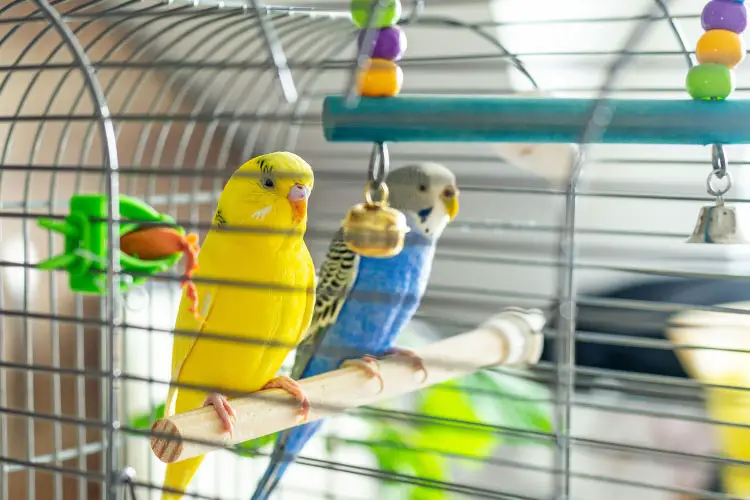The budgies are generally comfortable in the clement weather, which is neither too hot nor too cold. So you can say the room temperature (68 to 72 degrees Fahrenheit) is an ideal one for the budgies.
What’s the most suitable budgie temperature range? Ideally, it’s 70 to 75 degrees Fahrenheit, which is close to the room temperature range. However, they can still feel comfortable in the temperature range of 60 to 85 degrees Fahrenheit. Anything above or below is considered too hot or too cold for the budgies. They’re native to tropical and subtropical weather conditions and can manage warmer climates. But colder climates can make them vulnerable.
Although they can survive hotter temperatures up to 113F or colder temperatures down to 40F, it’ll be challenging for them unless some extra care is taken. If you’re wondering how to manage too hot or too cold weather for your budgie, read the article here.
Budgie Temperature Range: What’s the Ideal One
Budgies originated from Australian deserts and are mainly accustomed to tropical weather. They can adapt to moderate temperature changes only for a short period. It’s because they don’t have many feathers to keep them warm, nor do they have sweat glands to cool down either.
The most comfortable temperatures for a budgie are between 70 to 75 degrees Fahrenheit. But they’re flexible enough to live comfortably in the temperature range of 60 to 80 degrees Fahrenheit. The key to their survival is a steady temperature graph that doesn’t change drastically, like suddenly dropping from 70 to 40F or switching to a scorching temperature.
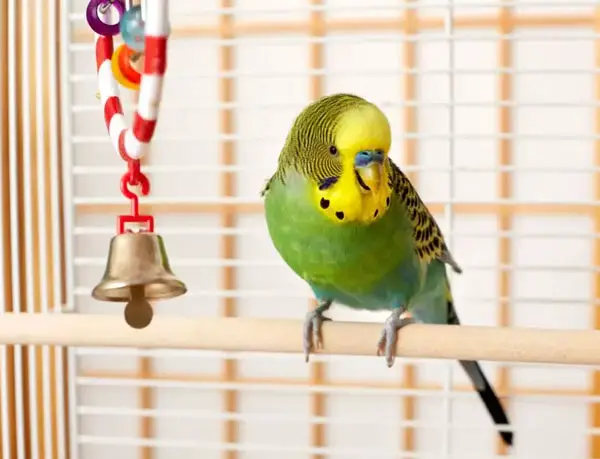
The wild budgies can cope with the heat by getting under a shade or water resources. But in the cold climate, they can hardly survive for a long time. According to the veterinarian Dr. Sara Ochoa, parakeets can’t relegate their body heat because of their tiny structure and can quickly die from cold.
When in captivity, they rely on their owner to manage the weather for them. With some care, they can survive both the hotter and colder climates.
Signs that Your Budgie is Feeling too Hot or Cold
Since you know what temperature your budgie is suitable at, you should focus on the weather conditions of your place, especially the daily temperature.
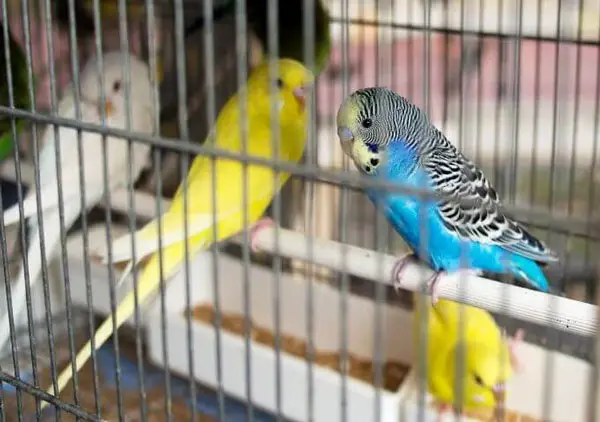
However, different budgies may find different temperature range suitable. So you can also look out for signs to understand whether your budgie is feeling too hot or cold.
Signs Your Budgie is Feeling Too Hot
When the atmosphere is too hot for a budgie (temperature above 85F), they’ll try to release heat into the atmosphere by spreading the wings and opening the beak. They’ll look unsettled trying to find a shade. You should also see them bathing a lot and drinking more water than usual. Other signs that the weather is too hot for your budgie include frequent panting and molting.
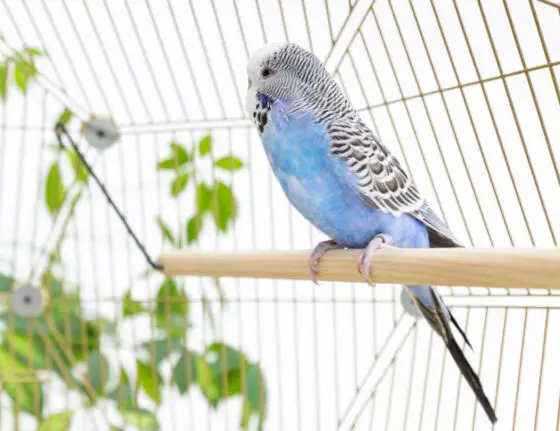
Also read: Budgie Tail Bobbing
Signs Your Budgie is Feeling Too Cold
If the budgie is too cold (temperature below 60F), it’s most likely to fluff its feathers and bury the beak into the chest. They may also squat to cover the legs under the feathers. One most common sign is they’ll shiver and won’t be as active as they used to be. The prolonged exposure to cold can cause hypothermia in your budgie. They may lose appetite, get seriously sick, and even die.
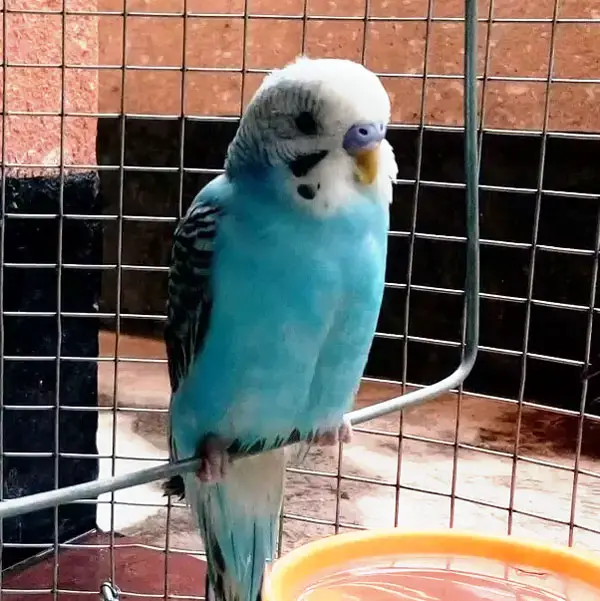
Managing a Hot Weather for Your Budgie
When managing hot weather for your budgie, you must be very careful about the heat waves. Since budgies don’t have sweat glands for body temperature regulation, there’s a high risk for heatstroke.
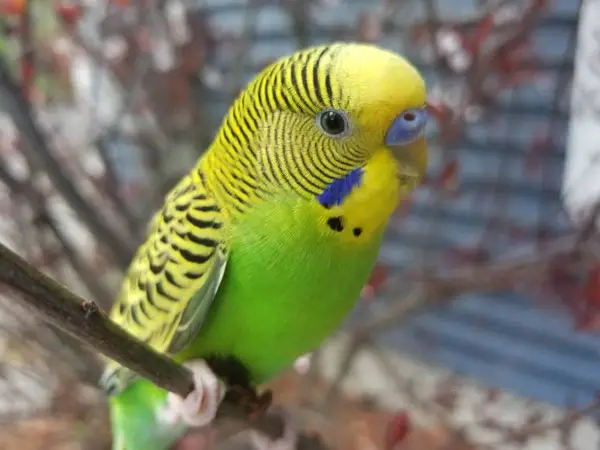
- The primary preparation for hot weather management includes a fan that needs to circulate cool air continuously. But it shouldn’t be placed directly on the budgie and needs to be swung in every way. The direct fan can dry out their beak and feet.
- If you already have an air conditioner installed in your room, you may have to use it to control the temperature of the room the budgie is in. But using an air conditioner can make the atmosphere too dry, causing your bird to suffer. So you’ve to ensure an air moisture source.
- If you don’t have an automatic source for moisture or humidifier, you can spray water around the room every few hours to ensure the required moisture for your feathered friend.
Managing a Cold Weather for Your Budgie
Managing cold weather is very important for your budgie as they’re highly vulnerable in such conditions. Luckily, many products can be used to keep your budgie’s cage warm.
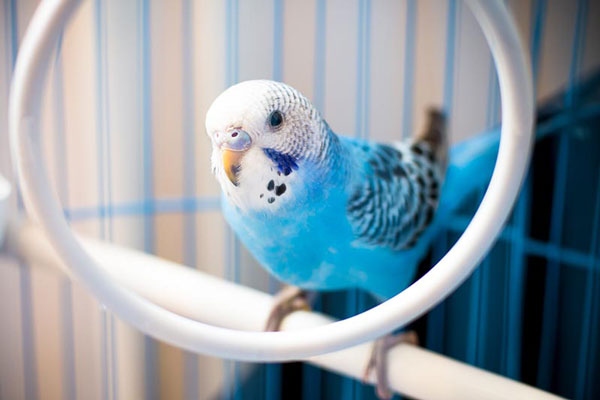
- In the cold, it’s essential to seal the environment. So don’t open the window if there’s a cold breeze outside. Or you can also move the cage to a warmer place in the house. Also, avoid an area near the kitchen or air vent even though it’s warm.
- Cage-specific or room heaters can help stabilize the room temperature and keep your pet bird comfortable. But make sure the heater is adjustable so you can set the temperature accordingly. You can also heat solar bulbs if you can’t manage a heater.
- If you’ve got perches in your budgie’s cage for their foot limbering or amusement, you can replace them with a Thermo heated perch in the colder months.
- You can also get a birdhouse for your budgie and pile them up with a vast amount of hay so the bird can build a warm and cozy nest.
- Finally, you can use a cotton sheet or fleece blanket as your budgie’s cage cover, so it doesn’t catch up to the cold winds. It’ll also trap the heat to keep the atmosphere warm for your bird.
FAQs
If you’re left with more queries, here are some FAQs answered below.
Since budgies don’t have sweat glands, they can’t regulate their body temperature naturally. To keep themselves cool, they’ll need to take a cold bath. After the bath, they fluff their feathers and open their wings, which allows them to catch the breeze and get more relaxed.
It’s essential to keep the environment warm and humid enough for the budgies. They’re most comfortable in 70 to 75F temperature and 60 to 70% humidity. So if you’re using a heater or air conditioner to stabilize the temperature, ensure the atmosphere’s moisture is also at the desired level.
Budgies are perfectly comfortable in an air conditioner if the temperature is kept at 70 to 75 degrees Fahrenheit. But you need to make sure the air doesn’t blow directly on the bird, and the air also doesn’t get too dry.
Related: Why Does My Budgie Puff Up And Is Sleepy?
Final Words
The ideal temperature range for budgies is between 70 to 75 degrees Fahrenheit; however, they’re still comfortable in the range of 60 to 85 degrees F. But the key is to keep the temperature steady. A drastic 20 degrees of change in either direction can make it harder for them to cope.
Since budgie can’t regulate their temperature, you’ve to manage the hot weather with a fan or AC unit for them. And when it’s cold, you must use the right tools and tactics to help your budgie deal with the weather. You can use a heater, heated perch, birdhouse, and cage cover to make your bird feel warm in the cold. All these little extra TLCs can help maintain the ideal temperature range for your feathered friend.
